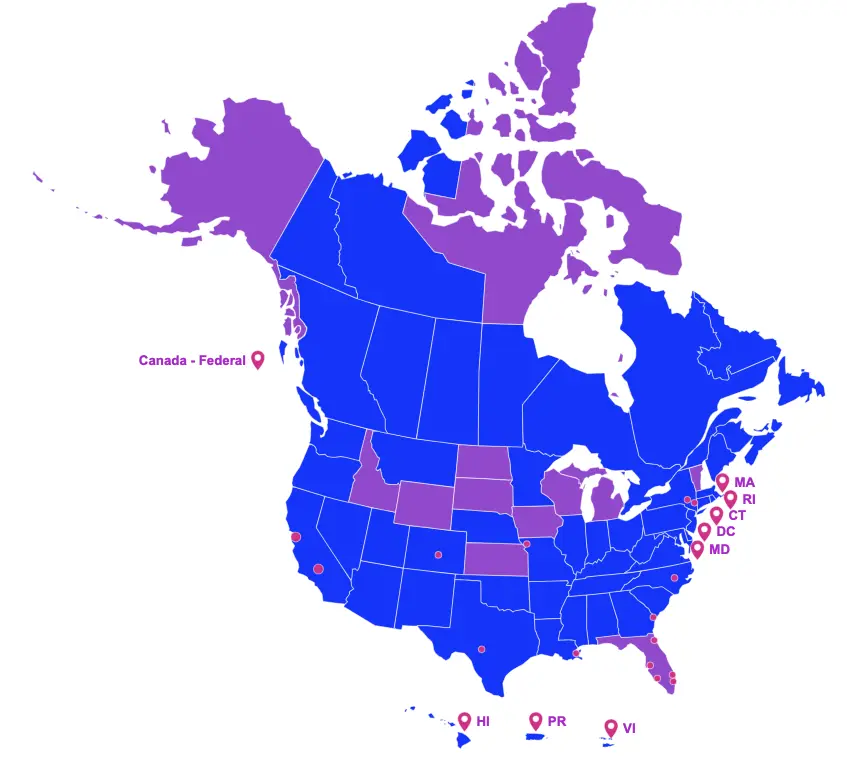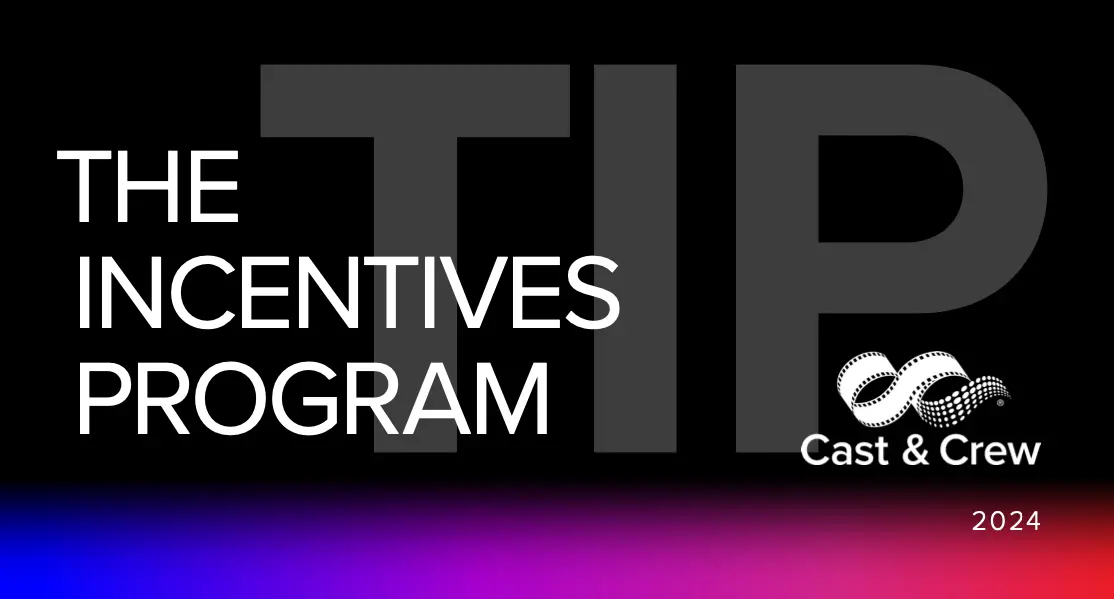THE INCENTIVES PROGRAM - TIP
A first look at our newsletter.
Cast & Crew Financial Services (CCFS) offers both U.S. and Canadian production incentive management services from setup to audit, as well as production incentive financing.
ENACTED LEGISLATION
Signed by the Governor
Indiana
On March 15, 2022, Governor Eric Holcomb signed Senate Bill 361, which creates the the Indiana Film and Media Production Tax Credit program, to be managed by the Indiana Economic Development (IED). Details of the program are as follows:
- Creates a nonrefundable and nontransferable tax credit equal to a percentage, to be determined by IED, that may not exceed 30 percent;
- Establishes a sunset date of July 1, 2027; and,
- Allows for a nine-year carryover of the credit.
Oregon
On March 24, 2022, Governor Kate Brown signed Senate Bill 1524, amending the Oregon Production Investment Fund Program, as follows:
- Increases the expense reimbursement percentages for each fiscal year (July 1 – June 30) beginning on or after July 1, 2022 to:
- 20 percent (from 10 percent) of payments made for employee salaries, wages and benefits for work done in Oregon; and,
- 25 percent (from 20 percent) of all other actual Oregon expenses.
This act shall take effect on the 91st day after the date on which the 2022 regular session of the Eighty-first Legislative Assembly adjourns sine die.
Utah
On March 24, 2022, Senate Bill 49, became law without Governor Spencer Cox’s signature, amending the Utah film production incentives program as follows:
- Creates an additional pool of funds for a fiscal year (July 1 – June 30) beginning on or after July 1, 2022 thru June 30, 2024 in the amount of $12 million to be used for rural productions only. This funding is in addition to the unrestricted ongoing funding of $6,793,700 for each fiscal year after June 30, 2022; and,
- Defines a “rural production” as a state-approved production in which at least 75 percent of the total number of production days occur within a county of the third, fourth, fifth, or sixth class.
Washington
On March 31, 2022, Governor Jay Inslee signed House Bill 1914, amending the Washington Motion Picture Competitiveness program as follows:
- Increases the annual incentive funding cap from $3.5 million to $15 million per calendar year;
- Establishes an enhancement award of up to 10 percent on a motion picture production’s state investment for motion pictures that are:
- Located or filmed in a “rural community”, as defined; or
- That tell stories of marginalized communities;
- Establishes funding assistance of up to $3 million for small motion picture productions produced in Washington state, if:
- The small motion picture production is creatively driven by Washington residents;
- Must have at least two Washington residents in any combination of the following positions:
- Writer, director, producer, or lead actor;
- Must demonstrate that the amount of the total actual investment for the production is less than $1 million; and,
- Extends the sunset date thru June 30, 2030.
West Virginia
On March 28, 2022, Governor Jim Justice signed House Bill 2096, reinstating the West Virginia Film Industry Investment Act. Details of the program are as follows:
- Establishes a transferable base tax credit of 27 percent;
- Allows for an additional 4 percent to be earned on all qualified expenditures if the eligible company employs 10 or more West Virginia residents as full-time employees working in the state or as apprentices working in the state;
- Incentivizes:
- Payments of wages (without limitation) that are subject to West Virginia tax;
- Payments made to a loan out company (without limitation) that are subject to West Virginia income tax;
- Nonpayroll expenditures that occur in West Virginia or with a West Virginia vendor;
- Establishes:
- A sunset date of December 31, 2027;
- An unlimited annual funding cap;
- An unlimited per project cap;
- Requirements:
- Incur a cumulative amount of $50,000 in a calendar year in direct production expenditures and post-production expenditures;
- Submit an expense verification report, using Agreed Upon Procedures, prepared by an independent certified public accountant; and,
- Recognize the State of West Virginia in the end credit roll.
This program shall apply to all taxable years beginning on or after July 1, 2022.
PROPOSED LEGISLATION
Still in the House or Senate
Georgia
House Bill 1053 proposes to amend the Georgia Entertainment Industry Investment Act and the Georgia Entertainment Industry Postproduction Investment Act, as follows:
- Modifies the definition of a taxable nonresident to include every person that is not otherwise a resident of this state for income tax purposes that receives income which is, at any time, derived from residual payments due to employment, trade, business, profession, or other activity performed or carried on within this state with respect to a state certified production;
- Clarifies that the above income shall be taxable income whether such income is received within or outside of this state;
- Requires each entity that claims a tax credit with respect to a state certified production to expressly consent to taxation as provided above, as a condition to obtaining the credit; and,
- Extends the sunset date and stipulates that for each year from January 1, 2023, through December 31, 2027, the aggregate amount of tax credits allowed for the postproduction credit is limited to $10 million.
House Bill 1330 proposes to amend the Georgia Music and Theatre Jobs Recovery Act, as follows:
- Increases the tax credit that may be earned on qualified production expenditures (QPE) for a musical or theatrical performance from 15 percent to 30 percent, while still allowing an additional 5 percent to be earned on QPE incurred in a county designated as a tier 1 or tier 2;
- Modifies the definition of a taxable nonresident to include every person that is not otherwise a resident of this state for income tax purposes that receives income which is, at any time, derived from residual payments due to employment, trade, business, profession, or other activity performed or carried on within this state with respect to a state certified production;
- Allows for a production company to aggregate qualified expenditures for one or more musical or theatrical and recorded musical performances over the course of a taxable year to meet or exceed the spending threshold;
- Redefines aggregate “spending threshold” requirement, as follows:
- For all musical or theatrical performances of a production company, equal or exceed $100,000;
- For recorded musical performances of a production company which are incorporated into or synchronized with a movie, television, or interactive entertainment productions, equal or exceed $50,000;
- For all other recorded musical performances of a production company, equal or exceed $50,000;
- Establishes the aggregate amount of credits that may be allowed, as follows:
- $5 million for taxable years beginning on or after January 1, 2023, and before January 1, 2024;
- $10 million for taxable years beginning on or after January 1, 2024, and before January 1, 2026;
- $15 million for taxable years beginning on or after January 1, 2026, and before January 1, 2028; and,
- Extends the sunset date thru December 31, 2027.
Hawaii
House Bill 1982 was passed by the House and sent to the Senate on March 8, 2022. The House bill proposes to amend the motion picture, digital media, and film production income tax credit as follows:
- Requires 10 percent income tax withholding on all payments made to a loan out company for services performed in the State;
- Imposes fees for processing qualified production applications;
- Requires 4.5 percent withholding, on all payments made to a loan out company, to be remitted to the Department of Taxation to the credit of the general excise account of the loan out company; and,
- Extends the sunset date of the program thru December 31, 2032.
Rhode Island
House Bill 7798 and Senate Bill 2760 propose to amend the Rhode Island Motion Picture Production Tax Credit program as follows:
- Increases the per project incentive cap from $7 million to $10 million and still allows the administrator to issue a waiver of the $10 million cap for any feature-length film or television series up to the remaining funds available;
- Increases the annual funding cap to $40 million per calendar year beginning January 1, 2023; and,
- Eliminates the sunset date of the program.
If enacted, this act would take effect upon passage.
IN THE NEWS
Croatia - Croatian Audiovisual Centre Proposes to Increase Incentives to 30% (April 5, 2022)
Georgia - Senate committee strips cap on film tax credits (April 1, 2022)
New Mexico - New Mexico Film Studios to break ground in Albuquerque next week (March22, 2022)
Washington - WA courts Hollywood with new movie studio and film tax incentive (March 21, 2022)


